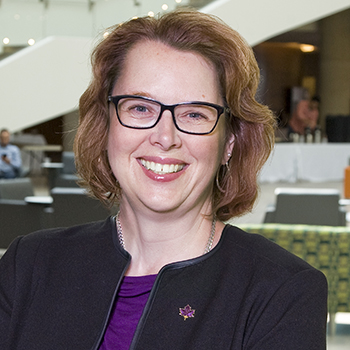When I reflect on the events of the past year, I see many ways that we have had to adapt and learn new ways of doing things and it brings to mind Laurier’s commitment to developing future-ready people and building a thriving community.
In mid-March, our university had to quickly shift to online and remote learning and conducting business in a virtual environment due to the COVID-19 pandemic. This was a monumental effort, the success of which required the hard work and collaboration of our staff, faculty and students. I am so proud of how we met this challenge together and continue to stay true to our academic mission in this "new normal."
In May, the brutal and tragic death of George Floyd was the catalyst, across many sectors of society, to demand without delay organizational and public policy changes to address systemic racism. The protests over the summer months demonstrated the anger, frustration, heartbreak, despair and solidarity felt in reaction to racism and racial violence.

– President Deborah MacLatchy
At Laurier, our students, staff, faculty and alumni have shared their own lived experiences with racism and racial injustice. We recognize that teaching and learning, and the creation and dissemination of knowledge, must take place in an institution that recognizes the dignity and value of each and every one of its members. And that we have more to do in this respect.
Inclusive community is a priority in the Laurier Strategy. As we went through the strategic planning process in 2019, people shared that, at Laurier, community is one of our greatest strengths. We also heard that many did not always feel that they belonged. Our response was to reaffirm our commitment to equity, diversity, inclusion (EDI) and Indigeneity.
The work of Arthur Chan, a diversity, equity and inclusion strategist, frames EDI as:
Laurier’s student body is becoming more diverse, reflecting the populations of our host communities and our global reach. We have made commitments and are taking steps to ensure that our faculty, staff, leadership and board of governors will better reflect these communities. For the work of equity and inclusion to be successful, it requires full engagement of, and support for, those who have historically been disenfranchised from higher education. At Laurier, equity and inclusion ideally result in a thriving community for all.
Much like adjusting to the pandemic required re-thinking and altering how we work and learn, our commitment to building a more equitable and inclusive university will require change. To that end, Laurier has outlined an action plan that holds us accountable for building an inclusive, welcoming and just community. As part of our plan, we are undertaking a number of actions, from participating in the federal Dimensions Pilot Program for EDI self-assessment, to incorporating Indigenous ways of knowing into our work and learning, to a number of student-focused initiatives such as providing culturally competent counselling services.
These are just the beginning. Two major activities in the coming year will be the development of an EDI Strategic Plan and an Indigenization Strategic Plan through full consultation with our community, including alumni.
Building thriving communities with people who are prepared for the challenges of the future requires diversity, equity and inclusivity. We have an opportunity now to re-imagine the ways that our society and, on a smaller scale, Laurier, operate. A more just and equitable society will elevate voices and perspectives that have been marginalized for too long.
As we have seen, the world has changed dramatically in the last year. The time is now to commit to change that will have a lasting impact.
Deborah MacLatchy
President and Vice-Chancellor
Wilfrid Laurier University